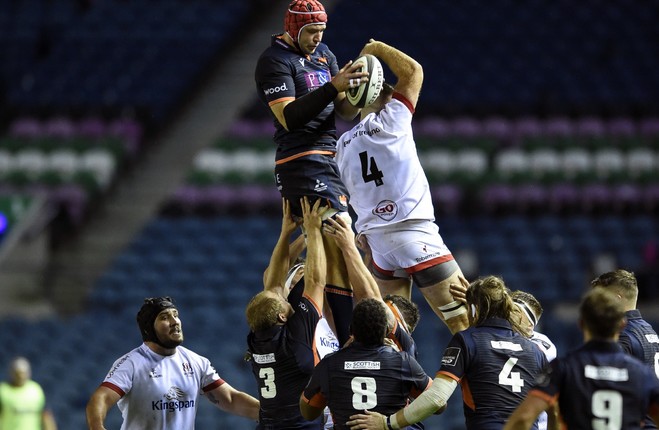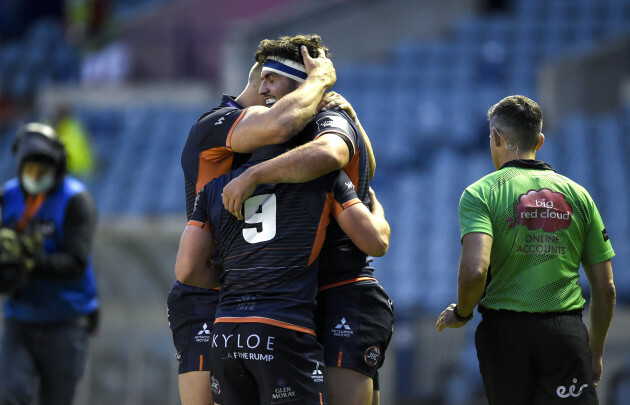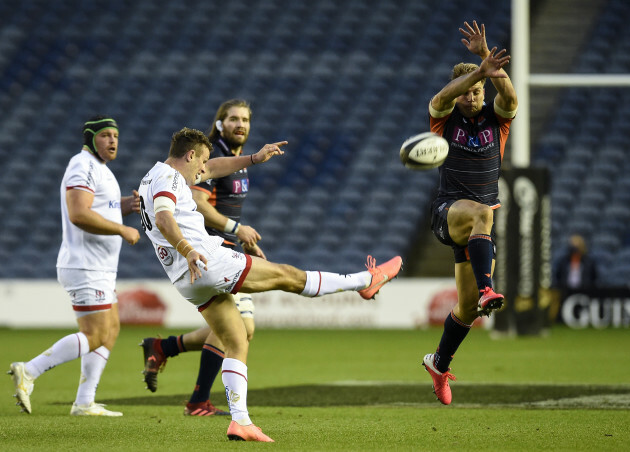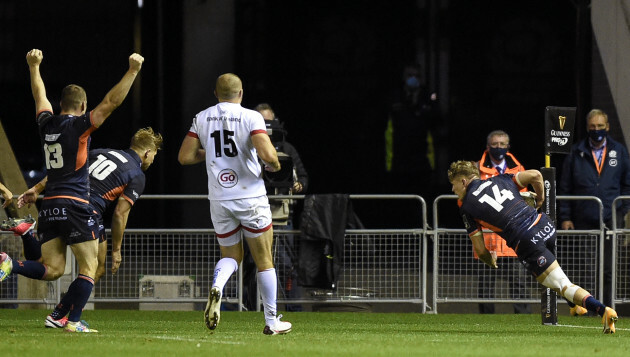LAST UPDATE | 5 Sep 2020
EDINBURGH 19
ULSTER 22
FOR YEARS THEIR supporters have asked one another to stand up for the Ulstermen.
And tonight those players stood up for themselves, staging a remarkable comeback, coming from 12 points down on two occasions, to win. The reward is a place in next Saturday’s Guinness Pro14 decider against Leinster at the Aviva.
They hardly need reminding that it is 14 years since they last won a trophy, seven since they even made it to a final. For a province with such a proud history – 26 interprovincial championships, a victory over the ’84 Wallabies, 1999 Heineken Cup winners – the last decade has been grim.
Hope gave way to despair before Dan McFarland arrived as head coach in 2018.
They needed him. And they needed this – a win of this nature, a comeback from 12-0 down, then from 19-7, a last-gasp charge that saw them score three tries in the second half, one with just five minutes to go.
And then there were the crunch kicks in those dramatic final minutes.
Ian Madigan got them, Madigan who was in danger of becoming Irish rugby’s forgotten man.
Now he has a chance to put one over his old team-mates this Saturday. Beyond him, there were other Ulster heroes, the try scorers, Rob Lyttle, Rob Herring and John Andrew.
There was also Coetzee, their giant South African, who was immense. Most of all, though, there was their coach, who made some big calls.
At this stage it is worth remembering that McFarland’s appointment in 2018 was greeted with shrugs rather than cheers on the terraces, the absence of head coaching experience on his CV not quite tallying with Ulster’s claim they’d sourced the world for the best possible candidate. Two years on, and especially after what happened here, it’s already clear they pulled off a coup getting him from Scotland. The mantra about the team fighting for every inch sits well with fans.
So too did the game plan they drew up for Murrayfield. Under McFarland, Ulster’s maul has been revived, their scrum improved — even if it remains an area that needs further development. Other problems remain, the issue of Billy Burns’s ability to control, never mind change games has been raised.
But he was good here, especially in the first half. And another thing is that Burns, indeed everyone, is playing for McFarland, who has changed the team’s mentality, installing a never-give-up spirit, evidenced by this sensational comeback.
They got off to a poor start. Duhan van der Merwe continued to make blistering breaks, Edinburgh continued to build pressure.
They got their rewards too, Stuart McInally getting the game’s opening score, when he sneaked down the blindside off a set-piece move after Ulster had stopped Edinburgh’s initial charge. The conversion attempt, from Jaco van der Walt, was missed.
It was time for Ulster to fight back. They did, too, winning penalties, getting deep into Edinburgh’s 22 to force a line-out of their own, just five metres from the Edinburgh line.
Unlike the Scots, though, they didn’t have sufficient composure, Edinburgh defending stoutly before a rushed pass from John Cooney led to Burns and Stockdale knocking on. The hosts could breathe a little easier.
In truth, they were the better side in that first half, their two wings, van der Merwe and Darcy Graham looking dangerous, the effectiveness of their ball retention forcing Ulster to work particularly hard to stay in the game. But they did – Cooney making one try-saving tackle just before half-time; Coetzee putting in an impressive shift, too.
Significantly, they had their homework done on Viliame Mata, the big Edinbugh No8, who was stopped in his tracks almost every time he got the ball.
At full-back, Stockdale looked safe under the high ball in that first half, yet he never had a chance to stretch his legs. That, in a nutshell, was Ulster’s problem in this period. Defensively, they had been solid and hard-working. Offensively, they hadn’t been able to dictate the terms and conditions of the half and when they did get decent field position in the Edinburgh 22, each time they messed up.
Still, even though Edinburgh had edged the opening period, it couldn’t have been lost on Ulster that they were just five points down, conscious that if they their possession game could become crisper and more polished that they were in with a shout.
They needed momentum, though, and McFarland sought to give them that by making some big calls at half-time – Cooney and Louis Ludik called ashore, Alby Mathewson coming in at scrum-half, Michael Lowry at full-back, with Stockdale shifting to the wing.
But it was another wing – Edinburgh’s Graham – who got the next score on 46 minutes, a superb finish in the right corner, made easier for him by virtue of first Chris Dean’s brilliantly guided pass to van der Walt who, in turn, sent Graham clear. With the extras added, Edinburgh had a 12-point lead and Ulster had some serious soul-searching to do.
They weren’t found wanting, though. With 53 minutes on the clock, they got the try of the game – with Burns, Coetzee, Stuart McCloskey and James Hume revealing pace, astonishingly instinctive awareness of their surroundings and the intelligence and skill to deliver the right passes at the right moments, presenting Rob Lyttle with the chance to finish.
He took it, stepping in from the right wing, changing pace as well as direction to touch down. Try, Ulster. 12-7. Game on.
Then three minutes later it looked like game over – as Edinburgh scored their third try, Hamish Watson the creator, his menacing run leaving a trail of Ulster defenders in his wake, his offload setting up Dean, who touched down. Van der Walt’s conversion made it a 12-point game and you couldn’t see a way back for Ulster.
To have a chance, they needed to get the next score.
And that was precisely what happened – Rob Herring getting it as Ulster, eventually, got their timing right at the line-out, set up a maul, offering Herring the space he needed to get over the line. Burns, however, missed the conversion and you wondered if that would come back to haunt him.
You also sensed their handling errors would cause future nightmares, Coetzee on 68 minutes, Lyttle on 70, spilling the ball in the Edinburgh 22 as Ulster enjoyed their best period of the game.
It didn’t cost them, though.
Significantly, their bench all made an impact – Mathewson proving to be a livewire, Sean Reidy having a fine game, so too John Andrew, who made the biggest contribution of all when he crossed on 75 minutes.
Suddenly there were two points in it.
Suddenly they looked to Madigan for the conversion. He had to hold his nerve. Nail this and this former Leinster man could become an instant hero in Belfast.
He did.
They were level now, four minutes left on the clock, filled with the energy that comes from scores of that nature.
Extra-time beckoned but before then, they had a chance to win it.
Stockdale won a penalty.
Madigan, again, stepped up.
He was 42 metres from the posts and glory. He didn’t think twice about taking his chance.
And tonight Belfast has a new hero.
Ulster scorers:
Tries: Lyttle, Herring, Andrew
Conversions: Burns 2 from 3, Madigan 1 from 1
Penalties: Madigan
Edinburgh scorers:
Tries: McInally, Graham, Dean
Conversions: van der Walt 2 from 3
Edinburgh: Blair Kinghorn; Darcy Graham, Mark Bennett, Chris Dean (George Taylor ’58); Duhan van der Merwe; Jaco van der Walt, Nic Groom (Charlie Shiel ’75); Rory Sutherland (Pierre Schoeman ’51), Stuart McInally (Captain) (Michael Willemse ’58), WP Nel (Simon Berghan ’47); Ben Toolis (Andrew Davidson ’68), Grant Gilchrist; Magnus Bradbury, Hamish Watson, Viliame Mata (James Ritchie ’63). Replacements: Nathan Chamberlain
Ulster: Jacob Stockdale, Louis Ludik (Michael Lowry ’41), James Hume, Stuart McCloskey, Rob Lyttle, Billy Burns (Captain) (Ian Madigan ’69), John Cooney (Alby Mathewson ’41); Eric O’Sullivan (Jack McGrath ’51), Rob Herring (John Andrew ’69), Tom O’Toole (Marty Moore ’51), Alan O’Connor, Sam Carter (Kieran Treadwell ’50), Matthew Rea, Jordi Murphy (Sean Reidy ’47), Marcell Coetzee
Referee: Frank Murphy (IRFU)




